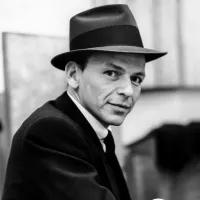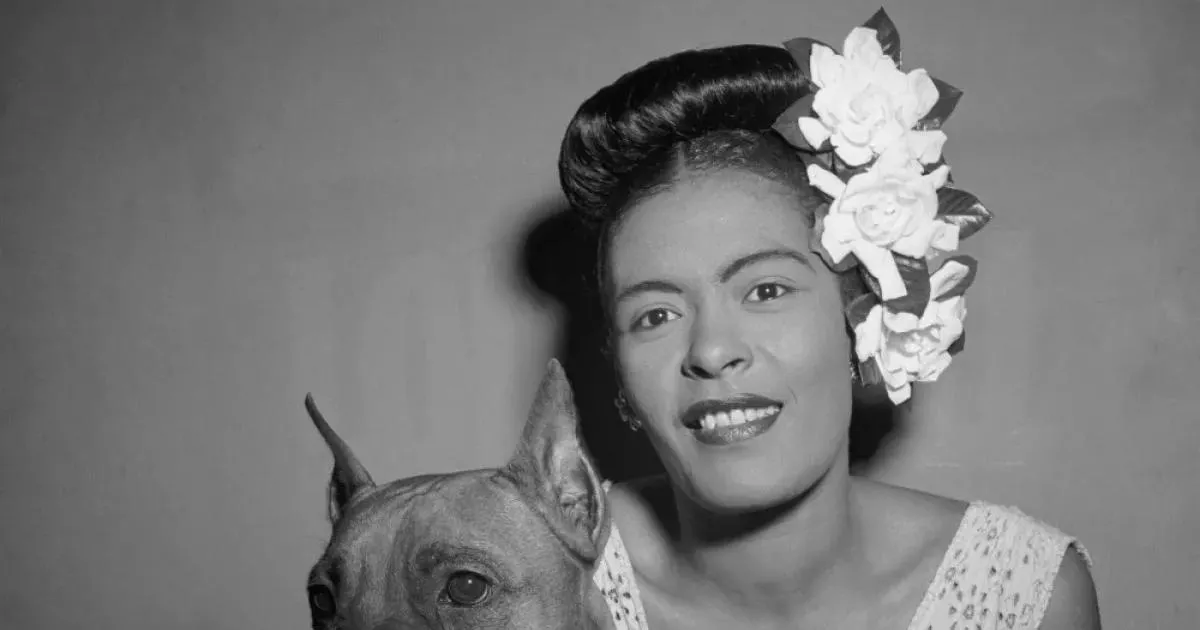Billie Holiday, also known as "Lady Day", was a prominent American jazz and swing singer. Her unique vocal style, influenced by jazz instrumentalists, revolutionized phrasing and tempo in jazz and pop music. Known for her exceptional vocal delivery and improvisational abilities, Holiday left a lasting impact on the music industry.
April 7, 1915: Birth of Billie Holiday
Billie Holiday, born Eleanora Fagan, was born on April 7, 1915, in Philadelphia. She would go on to become a significant figure in jazz and swing music, known for her vocal delivery and improvisational skills.
1920: Marriage of Billie Holiday's Mother
In 1920, Billie Holiday's mother, Sadie Harris, married Philip Gough, although the marriage lasted only a few years.
October 3, 1925: Release from Catholic Reform School
Billie Holiday was released from the House of the Good Shepherd, a Catholic reform school, on October 3, 1925, after a traumatic experience that left her deeply affected.
December 24, 1926: Attempted Rape and Protective Custody
On December 24, 1926, Billie Holiday's mother discovered a neighbor attempting to rape her. The man was arrested, and Holiday was placed in protective custody.
1926: Birth of Elaine Leighton
Elaine Leighton was born in 1926.
February 1927: Release from Protective Custody
Billie Holiday was released from protective custody in February 1927, after serving as a state witness in her attempted rape case.
1928: Exposure to Influential Music
By 1928, Billie Holiday had been exposed to the music of Louis Armstrong and Bessie Smith, which significantly influenced her musical style.
1929: Move to Harlem
By early 1929, Billie Holiday had joined her mother in Harlem, marking the beginning of her journey into the vibrant music scene there.
1929: Start of Singing Career
In 1929, Billie Holiday began singing in Harlem nightclubs, adopting her professional pseudonym inspired by actress Billie Dove and her probable father, Clarence Halliday.
1931: Performance at the Bright Spot
By 1931, Billie Holiday's reputation had grown, leading to performances at various clubs, including the Bright Spot, where Benny Goodman heard her sing.
1932: Replacement of Monette Moore at Covan's
In late 1932, Billie Holiday replaced singer Monette Moore at Covan's, a club on West 132nd Street, capturing the attention of producer John Hammond.
November 1933: Recording Debut with Benny Goodman
In November 1933, Billie Holiday made her recording debut at age 18 with Benny Goodman, recording 'Your Mother's Son-In-Law' and 'Riffin' the Scotch,' the latter becoming her first hit.
1933: Start of Recording Career with Columbia Records
Billie Holiday began her recording career with Columbia Records in 1933, releasing her music through their subsidiary labels.
1933: Release of "Riffin' the Scotch"
Billie Holiday's first major release, "Riffin' the Scotch", was released in 1933 under the name "Benny Goodman & His Orchestra" and sold 5,000 copies.
1934: A Meaningful Musical Connection
In 1934, Billie Holiday developed a close musical rapport with tenor saxophonist Lester Young, who had resided at her mother's house. Young, who nicknamed her "Lady Day", recognized a deep connection in their musical styles.
1935: Role in Symphony in Black
In 1935, Billie Holiday had a small role in Duke Ellington's musical short film 'Symphony in Black: A Rhapsody of Negro Life,' where she sang 'Saddest Tale.'
1935: Billie Holiday's Career Takes Off
In 1935, Billie Holiday was signed to Brunswick Records by John Hammond. Her collaboration with pianist Teddy Wilson resulted in successful recordings, including her breakthrough hit "What a Little Moonlight Can Do".
1935: Recording Contract with Brunswick
In 1935, after being discovered by producer John Hammond, Billie Holiday signed a recording contract with Brunswick. This led to successful collaborations and hit songs, including 'What a Little Moonlight Can Do.'
July 10, 1936: Recordings with Artie Shaw
Although Billie Holiday's time with Artie Shaw's band was marked by racial discrimination, they collaborated on several recordings in New York on July 10, 1936, including "Did I Remember?", "No Regrets", "Summertime", and "Billie's Blues".
July 1936: Releases Under Her Own Name
Billie Holiday began releasing music under her own name, with the band name "Billie Holiday & Her Orchestra", in July 1936.
1936: Summertime Success
In 1936, Billie Holiday's rendition of "Summertime" from George Gershwin's "Porgy and Bess" became a hit, further solidifying her popularity and musical impact.
1937: Commercial Success with 16 Best-Selling Songs
Billie Holiday achieved significant commercial success in 1937 with 16 best-selling songs, including her only number-one hit as a featured vocalist, "Carelessly".
1937: Joining Count Basie's Band
Billie Holiday joined Count Basie's band in late 1937, marking a significant step in her career. She had control over her song choices and arrangements, reflecting her evolving stage persona.
January 16, 1938: A Musical Showdown at the Savoy
On January 16, 1938, a significant event in jazz history took place at the Savoy Ballroom: a musical battle between the Count Basie and Chick Webb bands, featuring Billie Holiday and Ella Fitzgerald, respectively. While both bands were declared winners by different publications, Fitzgerald won the audience vote.
February 1938: Departure and a New Beginning
Billie Holiday's time with Count Basie's band ended in February 1938, with reasons cited as personal and professional differences. Shortly after, she made a groundbreaking move by joining Artie Shaw's band, becoming one of the first Black women to tour with a white orchestra.
March 1938: Radio Success
Billie Holiday and Artie Shaw's band achieved radio success in March 1938 with their broadcasts on New York City's powerful station WABC, boosting their popularity and recognition.
May 1938: Band Battles and Growing Recognition
Artie Shaw's band, featuring Billie Holiday, triumphed in band battles against other prominent bandleaders in May 1938, with audiences showing clear appreciation for Holiday's unique vocal stylings.
September 1938: Chart-Topping Success
By September 1938, Billie Holiday had firmly established herself as a prominent figure in the music industry. Her single "I'm Gonna Lock My Heart" achieved significant chart success, ranking among the most-played songs and solidifying her commercial appeal.
November 1938: Facing Discrimination and Departing Shaw's Band
Billie Holiday's experience with racial discrimination continued while touring with Artie Shaw's band. A particularly humiliating incident at the Lincoln Hotel in November 1938, where she was asked to use the service elevator, contributed to her decision to leave the band.
1938: Financial Success at Brunswick
By 1938, Billie Holiday's recordings, particularly "I Cried for You", achieved significant commercial success for Brunswick Records, selling thousands of copies and establishing her as a bankable artist.
April 20, 1939: Billie Holiday Records "Strange Fruit"
On April 20, 1939, Billie Holiday recorded "Strange Fruit" with Commodore Records, marking a pivotal moment in her career and in music history. The song's powerful message against lynching resonated deeply with Holiday, who connected it to her father's death due to racial prejudice. Despite its limited airplay, the record sold well, becoming one of her most impactful releases.
1939: Allegations of Targeting by Federal Bureau of Narcotics
According to some accounts, Billie Holiday became a target of the Federal Bureau of Narcotics under Harry J. Anslinger as early as 1939, potentially due to her performances of the controversial song "Strange Fruit."
1939: Recordings with Commodore Records
Billie Holiday recorded with Commodore Records in 1939.
1939: Release of "Strange Fruit"
Billie Holiday released her highest-selling record, "Strange Fruit", with Commodore in 1939, which reached number 16 on the pop charts.
1939: Billie Holiday Begins Performing "Strange Fruit"
In 1939, Billie Holiday was introduced to the song "Strange Fruit" by Barney Josephson, the owner of Café Society. The song, a powerful statement against lynching, deeply resonated with Holiday, reminding her of her father's death due to racial prejudice. Despite her initial hesitation, she began performing it at the club, marking a significant moment in her career.
1940: Billboard's Modern Pop Charts
Billboard began publishing its modern pop charts in 1940, which included the Best Selling Retail Records chart, a precursor to the Hot 100.
August 25, 1941: Holiday Marries Jimmy Monroe
Billie Holiday married trombonist Jimmy Monroe on August 25, 1941.
1941: Success of "God Bless the Child"
"God Bless the Child", which eventually sold over a million copies, ranked number 3 on Billboard's year-end top songs of 1941.
June 12, 1942: Billie Holiday Records "Trav'lin Light" Under Pseudonym
On June 12, 1942, while still under contract with Columbia, Billie Holiday recorded "Trav'lin Light" with Paul Whiteman for Capitol Records using the pseudonym "Lady Day." This release highlighted her versatility and ability to navigate the complexities of the music industry. The song became a hit, showcasing her enduring appeal to a broad audience.
October 24, 1942: Billboard Introduces R&B Charts
Billboard started issuing its R&B charts on October 24, 1942.
1942: End of Contract with Columbia Records
Billie Holiday's contract with Columbia Records ended in 1942.
October 11, 1943: Life Magazine Recognizes Billie Holiday's Distinctive Style
On October 11, 1943, Life magazine acknowledged Billie Holiday's unique and impactful vocal style. This recognition solidified her status as a trendsetter and a major force in the music world, influencing countless other vocalists.
1943: Billie Holiday Adds "Lover Man" to Her Repertoire
In 1943, after witnessing the success of "Lover Man" performed by Willie Dukes, Billie Holiday incorporated the song into her own shows. This decision reflected her keen understanding of popular trends and her ability to adapt and innovate within her own style.
August 7, 1944: Billie Holiday Signs with Decca Records
On August 7, 1944, at the age of 29, Billie Holiday signed with Decca Records, a pivotal move that would mark a new chapter in her already illustrious career.
October 4, 1944: Billie Holiday Records "Lover Man"
On October 4, 1944, Billie Holiday recorded "Lover Man," one of her most successful songs, for Decca Records. Initially hesitant about the orchestral arrangement, Holiday embraced the opportunity to expand her sound, showcasing her versatility as an artist.
1944: Signing with Decca Records
Billie Holiday signed with Decca Records in 1944.
1944: Billie Holiday Returns to Commodore Records
Billie Holiday's career reached new heights in 1944 when she returned to Commodore Records, re-recording some of her earlier hits and adding new ones to her repertoire. Notably, her rendition of "Embraceable You" from this period was later inducted into the Grammy Hall of Fame in 2005.
August 1945: Billie Holiday Re-records "Don't Explain"
In August 1945, Billie Holiday re-recorded "Don't Explain," making significant changes to the lyrics, perhaps reflecting evolving emotions and experiences in her personal life. This re-recording demonstrated her commitment to artistic expression and her willingness to revisit and reinterpret her own work.
1945: "Lover Man" Becomes Holiday's Last Charting Hit
By 1945, "Lover Man" marked Billie Holiday's final appearance on the music charts for several years.
September 1946: Holiday Begins Filming "New Orleans"
In September 1946, Billie Holiday embarked on her only major film project, "New Orleans," where she shared the screen with Louis Armstrong and Woody Herman.
1946: Holiday Wins Metronome Magazine Popularity Poll
Billie Holiday won the Metronome magazine popularity poll in 1946.
1946: Holiday's Performances Receive Mixed Reviews
By 1946, Holiday's performances were drawing mixed reactions. While Metronome magazine acknowledged the success of her signature style, they also pointed out the risk of it becoming repetitive. Similarly, the New York Herald Tribune noted a lack of melodic and tempo variation in one of her 1946 concerts.
1946: Billie Holiday Records "Good Morning Heartache"
In 1946, Billie Holiday recorded "Good Morning Heartache," a song that, although not a chart-topper, became a staple in her live performances, demonstrating her ability to connect with audiences through emotionally resonant material.
May 16, 1947: Holiday Arrested for Narcotics Possession
On May 16, 1947, Billie Holiday was arrested at her New York apartment for narcotics possession, a charge that would have significant consequences for her life and career.
July 6, 1947: Holiday's Popularity Highlighted in Music Polls
On July 6, 1947, Billboard's annual college poll ranked Holiday fifth among popular "girl singers," reflecting her significant standing in the music industry.
1947: Holiday's Relationship with Joe Guy Ends; Divorce from Jimmy Monroe
Billie Holiday's relationship with trumpeter Joe Guy, who was also her drug dealer, ended in 1947. In the same year, she divorced Jimmy Monroe.
1947: "New Orleans" Film Production Faces Challenges and Edits
In 1947, the production of "New Orleans" encountered significant obstacles due to racism and McCarthyism. Producer Jules Levey and scriptwriter Herbert Biberman faced pressure to minimize the roles of Holiday and Armstrong to downplay the Black origins of jazz. The situation escalated when Biberman was blacklisted as one of the Hollywood Ten and subsequently jailed, leading to the removal of several scenes featuring Holiday.
March 16, 1948: Holiday Released from Prison, Greeted by Chaos
Upon her release from prison on March 16, 1948, due to good behavior, Billie Holiday was met with a chaotic scene at Newark. Her pianist Bobby Tucker and beloved dog Mister were there to welcome her; however, the dog's enthusiastic greeting was mistaken for an attack by an onlooker.
March 27, 1948: Holiday Triumphs at Carnegie Hall Comeback Concert
On March 27, 1948, Billie Holiday made a triumphant return to the stage with a sold-out concert at Carnegie Hall. The event was a testament to her enduring popularity, with a record-breaking 2,700 tickets sold in advance. Despite a lack of a current hit record, Holiday captivated the audience with a 32-song setlist that included classics like Cole Porter's "Night and Day" and her iconic 1930s anthem "Strange Fruit."
April 27, 1948: Holiday's Broadway Show, "Holiday on Broadway," Debuts
On April 27, 1948, Billie Holiday's Broadway show, aptly titled "Holiday on Broadway," premiered to a sold-out audience and received positive reviews from both music and theater critics. Despite its initial success, the show had a limited run, closing after three weeks.
1948: Holiday Records "I Loves You, Porgy"
Billie Holiday recorded George Gershwin's "I Loves You, Porgy" in 1948.
1948: Holiday Performs at the Ebony Club Despite Legal Risk
In 1948, Billie Holiday took a risk by performing at the Ebony Club, even though she lacked the necessary cabaret card due to her prior arrest. Her manager, John Levy, believed he could resolve the legal issue and allowed her to proceed with the engagement. Despite Holiday's initial fear of being caught, the performances were a success.
January 22, 1949: Holiday Arrested Again in San Francisco
Billie Holiday faced another arrest on January 22, 1949, this time in her hotel room at the Hotel Mark Twain in San Francisco.
October 1949: Holiday Records "Crazy He Calls Me"
In October 1949, Billie Holiday recorded "Crazy He Calls Me," a song that would later gain significant recognition.
1950: Holiday Appears in Universal Short Film
Billie Holiday appeared in a short film for Universal in 1950, titled "Sugar Chile Robinson, Billie Holiday, Count Basie and His Sextet." In the film, she sang "God Bless the Child" and "Now, Baby or Never."
1950: End of Contract with Decca Records
Billie Holiday's contract with Decca Records ended in 1950.
1951: Brief Stint with Aladdin Records
Billie Holiday briefly recorded with Aladdin Records in 1951.
1952: Signing with Verve Records
Billie Holiday signed with Verve Records in 1952.
January 1954: Holiday Embarks on First European Tour
Billie Holiday embarked on her inaugural European tour in January 1954, joining a package tour organized by Leonard Feather and spearheaded by Swedish impresario Nils Hellstrom. The tour, dubbed "Jazz Club U.S.A.," commenced in Stockholm before moving through Germany, the Netherlands, Paris, and Switzerland.
1954: Posthumous Recognition
Even after her death, Billie Holiday's music continued to be celebrated. Joel Whitburn's "Pop Memories: 1890–1954", published in 1954, highlighted the success of "I'm Gonna Lock My Heart", showcasing her lasting impact on music history.
1954: Publication of "Pop Memories 1890–1954"
The book "Pop Memories 1890–1954", detailing the findings of Record Research's compilation of pre-rock and roll chart information, was published in 1954.
June 1956: Release of "Lady Sings the Blues" LP
In June 1956, Billie Holiday released the LP "Lady Sings the Blues" to accompany her autobiography. The album featured a combination of new tracks and re-recordings of her hit songs.
November 10, 1956: Billie Holiday's Carnegie Hall Concerts
Billie Holiday performed two sold-out concerts at Carnegie Hall on November 10, 1956. The second concert was recorded and later released as an album.
December 22, 1956: "Lady Sings the Blues" LP Review in Billboard
On December 22, 1956, Billboard magazine published a positive review of Holiday's "Lady Sings the Blues" LP, praising her vocals and the selection of songs.
1956: Publication of Lady Sings the Blues
Billie Holiday's autobiography, 'Lady Sings the Blues,' was published in 1956. It offers a personal, albeit inconsistent, account of her early life and career.
1956: "Lady Sings the Blues" Autobiography Publication
In 1956, Billie Holiday's autobiography, "Lady Sings the Blues," was published. Ghostwritten by William Dufty, the book recounts Holiday's life story based on conversations with her and earlier interviews.
March 28, 1957: Billie Holiday's Marriage to Louis McKay
Billie Holiday married Louis McKay, a mob enforcer, on March 28, 1957. Like many men in her life, McKay was abusive. They were separated at the time of her death.
1957: Return to Columbia Records
Billie Holiday returned to Columbia Records in 1957.
1957: Billie Holiday Performs at "Jazz Under the Stars"
Billie Holiday was a headliner alongside Dinah Washington and other artists in the 1957 summer concert series "Jazz Under the Stars" at Wollman Memorial Theater in Central Park.
1958: Release of Lady in Satin
Billie Holiday released her final album, 'Lady in Satin,' in 1958. Although her voice had altered due to personal struggles, the album achieved mild commercial success.
1958: End of Second Stint with Columbia Records
Billie Holiday's second stint with Columbia Records concluded in 1958.
1958: Holiday Faces Financial Hardships
By 1958, Billie Holiday's financial situation had become dire. Her earnings were severely limited by the loss of her cabaret card, which prevented her from performing at venues that served alcohol. Despite her earlier success, she received minimal royalties, with a mere $11 in 1958. The situation was exacerbated by the fact that many of her records were no longer in print, and her lawyer at the time had only registered two of her songs with BMI, further reducing her potential income.
1958: Frank Sinatra's Admiration for Holiday
Frank Sinatra, in a 1958 interview with Ebony magazine, discussed how Billie Holiday's performances on 52nd Street influenced him in his younger years.
March 1959: Death of Lester Young
Lester Young, a close friend and musical collaborator of Billie Holiday, died in March 1959. Holiday's request to sing at his funeral was denied.
March 1959: Setting of "Lady Day at Emerson's Bar and Grill"
The play "Lady Day at Emerson's Bar and Grill" is set in March 1959 and portrays Billie Holiday's life and career.
May 1959: Billie Holiday's Declining Health
By May 1959, Billie Holiday's health had significantly deteriorated, resulting in weight loss and a relapse into drinking despite doctor's orders.
May 31, 1959: Billie Holiday Hospitalized
Despite attempts by friends and colleagues to intervene, Billie Holiday's declining health led to her hospitalization on May 31, 1959, for liver and heart disease.
June 12, 1959: Adelaide Hall's Secret Visit
Around June 12, 1959, singer Adelaide Hall paid a secret visit to Billie Holiday while she was hospitalized at the Metropolitan Hospital.
July 17, 1959: Death of Billie Holiday
Billie Holiday passed away on July 17, 1959, at the age of 44. She left behind a legacy that significantly influenced jazz music and pop singing.
1959: Recordings with MGM Records
Billie Holiday recorded with MGM Records in 1959.
1959: Frank O'Hara's Poem
Frank O'Hara wrote his poem "The Day Lady Died" in 1959, featuring an impression of Holiday performing at the Five Spot Café towards the end of her career.
1959: Billie Holiday's Final Recordings and Television Appearances
In 1959, Billie Holiday made one of her last television appearances on Granada Television's "Chelsea at Nine" in London, where she performed "Strange Fruit." She also recorded her final studio sessions for MGM Records, which were released posthumously.
1961: Billie Holiday Inducted into Down Beat Hall of Fame
Billie Holiday's legacy in jazz was solidified in 1961 when she was posthumously voted into the Down Beat Hall of Fame.
1961: Release of "The Essential Billie Holiday" Album
Recordings from Billie Holiday's second Carnegie Hall concert in 1956 were released in 1961 as "The Essential Billie Holiday" album in the UK.
1966: Billy Stewart's "Summertime" Chart Success
Billy Stewart's R&B rendition of "Summertime" reached number 10 on the charts in 1966, surpassing Billie Holiday's earlier chart placement for the jazz standard.
1972: Diana Ross's Oscar Nomination for "Lady Sings the Blues"
Diana Ross's portrayal of Billie Holiday in the 1972 film "Lady Sings the Blues" earned her an Academy Award nomination and a Golden Globe win, further amplifying Holiday's public recognition.
1972: Release of "Lady Sings the Blues"
The film "Lady Sings the Blues", loosely inspired by Billie Holiday's autobiography, premiered in 1972 and was nominated for five Academy Awards.
1972: "Lady Sings the Blues" Film Release
The film adaptation of "Lady Sings the Blues," starring Diana Ross as Billie Holiday, was released in 1972.
1976: "God Bless the Child" Inducted into Grammy Hall of Fame
In 1976, Billie Holiday's iconic song "God Bless the Child" was inducted into the Grammy Hall of Fame, further solidifying its place as a timeless classic and a testament to Holiday's lasting impact on music.
1985: Start of Baltimore Statue Project
The construction of a statue honoring Billie Holiday began in Baltimore in 1985.
1986: Premiere of "Lady Day at Emerson's Bar and Grill"
"Lady Day at Emerson's Bar and Grill", a play about Billie Holiday with music by Lanie Robertson, premiered at the Alliance Theatre in 1986.
1986: Compilation of Pre-Rock and Roll Charts
Joel Whitburn's company, Record Research, compiled data on the popularity of recordings released before the rock and roll era in 1986, creating pop charts dating back to the beginning of the commercial recording industry.
December 1988: Release of "Angel of Harlem"
Irish rock band U2 released their single "Angel of Harlem" in December 1988 as a tribute to Billie Holiday.
1988: Hall's Account Recorded
Journalist Max Jones recorded a taped interview with Adelaide Hall in 1988, where she spoke about her secret visit to Billie Holiday.
1993: Completion of Baltimore Statue
The statue of Billie Holiday in Baltimore, featuring panels inspired by her song "Strange Fruit", was completed in 1993.
1995: Stuart Nicholson's Biography
In 1995, Stuart Nicholson published a biography of Billie Holiday, confirming many details of her early life and career.
1997: Ray Ellis on "Lady in Satin"
In 1997, Ray Ellis, who arranged and conducted Billie Holiday's final major album "Lady in Satin", spoke about the making of the album.
2000: Induction into Rock & Roll Hall of Fame
In 2000, Billie Holiday was inducted into the Rock & Roll Hall of Fame as an early influence, acknowledging her significant impact on jazz music.
2000: Portrayal in "Touched by an Angel"
Paula Jai Parker portrayed Billie Holiday in a 2000 episode of the television series "Touched by an Angel" titled "God Bless the Child".
2005: Billie Holiday's "Embraceable You" Inducted into Grammy Hall of Fame
In 2005, Billie Holiday's 1944 recording of "Embraceable You" was posthumously inducted into the Grammy Hall of Fame, solidifying its legacy as a timeless classic and a testament to Holiday's enduring impact on music.
2010: "Crazy He Calls Me" Inducted into Grammy Hall of Fame
"Crazy He Calls Me" was inducted into the Grammy Hall of Fame in 2010, solidifying its legacy as one of Billie Holiday's most celebrated recordings.
2012: Death of Elaine Leighton
Elaine Leighton died in 2012.
2012: NPR Documentary on Billie Holiday's Burial Plot
In 2012, NPR aired a documentary that explored the story behind Billie Holiday's burial plot and how it was handled by her estranged husband, Louis McKay.
2014: Tony Award for "Lady Day at Emerson's Bar and Grill"
Audra McDonald won a Tony Award in 2014 for her performance in the Broadway production of "Lady Day at Emerson's Bar and Grill".
2015: Publication of "Chasing the Scream: The First and Last Days of the War on Drugs"
Johann Hari's 2015 book, "Chasing the Scream: The First and Last Days of the War on Drugs," put forth the allegation that Billie Holiday was targeted by the Federal Bureau of Narcotics for singing "Strange Fruit," a claim disputed by some.
2015: Publication of "Billie Holiday: The Musician and the Myth"
John Szwed's "Billie Holiday: The Musician and the Myth," published in 2015, analyzed Holiday's autobiography and suggested that certain relationships were omitted or minimized due to legal threats.
2016: HBO Broadcast of "Lady Day at Emerson's Bar and Grill"
A Broadway production of "Lady Day at Emerson's Bar and Grill", starring Audra McDonald, was filmed and aired on HBO in 2016, earning McDonald an Emmy nomination.
2019: Announcement of New York City Statue
Chirlane McCray announced plans for a statue honoring Billie Holiday near Queens Borough Hall in New York City in 2019.
2019: Release of Documentary "Billie"
The documentary film "Billie", based on interviews conducted in the 1970s by Linda Lipnack Kuehl for an unfinished biography of Holiday, was released in 2019.
2021: Release of The United States vs. Billie Holiday
The film 'The United States vs. Billie Holiday,' released in 2021, depicts significant events in Billie Holiday's life, further cementing her legacy in popular culture.
July 2022: Revelation of Hall's Visit
In July 2022, Iain Cameron Williams, author of Adelaide Hall's biography, revealed the secret visit Hall made to Holiday in June 1959.
2023: Billie Holiday's Financial Situation at Death
At the time of her death, Billie Holiday had been exploited financially and had only US$0.70 in the bank, which would be equivalent to approximately $7.40 in 2023.
2023: Ranked Fourth on Rolling Stone's List
In 2023, Billie Holiday was ranked fourth on Rolling Stone's list of '200 Greatest Singers of All Time,' highlighting her enduring influence on music.
Mentioned in this timeline
Home Box Office HBO is an American pay television service...

Frank Sinatra nicknamed Chairman of the Board and Ol' Blue...

San Francisco is a major commercial financial and cultural hub...
Germany officially the Federal Republic of Germany is a Western...

Diana Ross is a highly acclaimed American singer and actress...
National Public Radio NPR is an American public broadcasting organization...
Trending

11 months ago Alex Sarr Shines as Wizards Beat Pistons: Sarr's 19 Points Not Enough
3 months ago Rutgers Student Critically Injured at Fraternity House: Investigation Underway, Safety Concerns Raised.

2 months ago Ryan Seacrest's Impressive Workout: Biceps Bulge Surprises Fans After Hollywood Exit

10 months ago Lily Collins Shares Adorable Dance Party with Daughter Tove and Celebrates First Birthday as Mom.

10 months ago Caitlin Clark, Serena Williams at NFL Meeting; Flag Football for LA28.
8 months ago Queens 10K Returns: Race, Festival, Kids Run & Community Engagement in 2025
Popular

Thomas Douglas Homan is an American law enforcement officer who...

William Franklin Graham III commonly known as Franklin Graham is...

XXXTentacion born Jahseh Dwayne Ricardo Onfroy was a controversial yet...

Jupiter is the fifth and largest planet from the Sun...

Instagram is a photo and video-sharing social networking service owned...

KFC or Kentucky Fried Chicken is an American fast-food chain...
